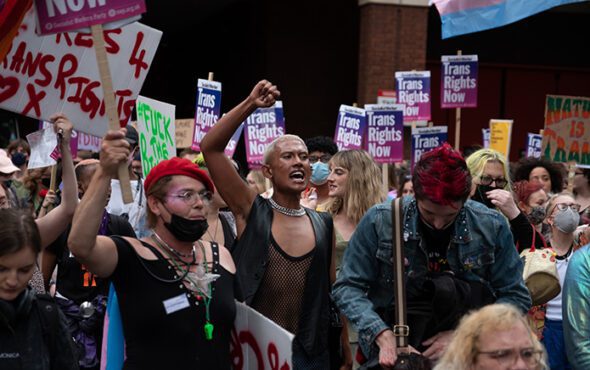
One of the UK’s leading human rights watchdogs is facing an international review over its recent stance on LGBTQ+ rights.
The Equality and Human Rights Commission (EHRC), which says it aims to promote and uphold equality laws in the UK and is funded by the UK government’s Equalities Office, made headlines in January for suggesting a “differentiated approach” to a trans ‘conversion therapy’ ban.
It also urged Scotland to pause plans to simplify the gender recognition process, something that Stonewall called “an attack on trans equality”.
On 10 February, the aforementioned LGBTQ+ charity confirmed that it has submitted documents to the United Nations (UN) and GAHNRI (the international accreditation body for human rights organisations) calling for a review into the EHRC’s status as an A-grade accredited human rights organisation.
“The submission is prompted by the EHRC’s recent, and significant, change in stance on the issue of trans rights,” Stonewall’s statement said.
“Their recent statements on GRA reform in Scotland, and the conversion therapy ban in England and Wales, not only reverse their long-held positions, but are in stark contrast to international human rights standards.
“The EHRC’s stance seeks to strip trans people of legal protections, and pose a grave threat to the ability of trans people to participate in daily life with dignity and respect.”
The @EHRC is no longer acting as a credible, independent human rights institution. They are pushing an anti-trans agenda over international human rights law. Today we've submitted evidence to the @UN and @Ganhri1 to intervene in support of trans rights. Read more + take action🧵
— Stonewall (@stonewalluk) February 11, 2022
Stonewall’s submission is supported by the Good Law Project, with signatories including an array of LGBTQ+ charities and organisations such as TransActual, Mermaids and the LGBT Foundation, among others.
Jolyon Maugham, Director of the Good Law Project, added: “The EHRC is subject to a level of oversight and micro-management from the Department which is just not consistent with being a UN Human Rights Institution.
“They are supposed to be independent from Government but the EHRC looks much more like a tool of Government.”
If the EHRC has its position downgraded after a review, it will lose participation rights at the UN Human Rights Council, as well as its ability to vote at GANHRI meetings.
“The politicisation of the GB’s human rights body to take a determinedly anti-trans stance has placed trans people in the firing line,” Stonewall’s statement added.
Rob Cookson, Deputy Chief Executive of the LGBT Foundation, said the review is “urgently needed”.
In a statement shared with the BBC, the EHRC said its position is “based on evidence in the UK and internationally”.
It continued: “All appointments to our non-executive and executive roles are made through a fair, open and transparent recruitment process.
“The way the commission is governed and commissioners appointed is set out in the Equality Act, and has not changed since the commission was established.”
I share the concerns of @stonewalluk and dozens of LGBTQ+ organisations that the @EHRC is being influenced by the government's anti-trans agenda.
The EHRC has a duty to be independent and to protect all human rights.
Solidarity with those taking legal action. https://t.co/k5CSlq5LFw
— Nadia Whittome MP (@NadiaWhittomeMP) February 11, 2022
The human rights body has been facing increasing scrutiny from LGBTQ+ activists who have questioned whether or not it is “truly fit for purpose” after its aforementioned statements in January 2022.
“Legislation to ban conversion therapy attempting to change a person to or from being transgender should follow, once more detailed and evidence-based proposals are available which can be properly scrutinised,” it stated, appearing to suggest a delay in banning trans ‘conversion therapy’.
Jayne Ozanne, Chair of the Ban Conversion Therapy Coalition, told GAY TIMES at the time that she was “perplexed” by the response of the EHRC given what research on the practice shows.
“The government’s own research – along now with significant international research and hundreds of survivor testimonies – has shown that the most common form of ‘conversion therap’ is to be found in religious settings and those who are most at risk of ‘conversion therapy’ are trans and non-binary people,” she continued.



